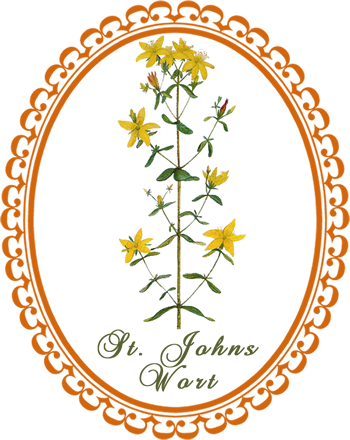
St. John's Wort: a nerve tonic oil made with St. John's wort flowers is excellent for gently massaging into areas where there is nerve strain or pain, for example, in cases of repetitive strain injury or neuralgia ...
Common Names: St John's Wort, Johnswort, Scare-Devil, Goat Weed
Botanical Name: Hypericum perforatum
Family: Clusiaceae
Plant Type: Hardy perennial
Parts Used: Dried flowering tops, leaves
Flowering: June
Native to Europe and temperate regions of Asia, St. John's wort has been naturalized in North America and Australia. It is found in open woods, meadows, and along roadsides.
Description: A hardy perennial about two feet in height, St. John's wort has erect, woody-based stems and small, linear-to-oval, gland-dotted leaves. The bright yellow, five petaled flowers are also edged with small dark-coloured glands. The entire plant smells faintly of turpentine or balsam.
Cultivation: St. John's Wort is a perennial, hardy to zone 5. It will grow in just about any soil in full sun to part shade.
Harvesting: Gather the flowers or whole herb when in bloom in midsummer.
St. Johns Wort Magick
Health. Protection. Strength. Love. Divination. Happiness.
Gender: Masculine
Planet: Sun
Element: Fire
Use in rituals, or carry to detect other magicians.
Hang it in a window to protect against storms, thunderbolts, fire, and evil spirits.
Gather this herb on Midsummer or on a Friday and wear it to keep mental illness at bay.
Dry the herb over the Midsummer fire and hang near the window to keep ghosts, necromancers and evildoers from the house.
Herbal Healing with St. John's Wort
Medicinal Actions: Abortifacient, alterative, analgesic, antibacterial, antidepressant, antifungal, anti-inflammatory, antiseptic, antispasmodic (menstrual cramps), antiviral, astringent, blood purifier, calmative, carminative, diuretic, emmenagogue, euphoric, expectorant, febrifuge, hemostatic, nervine, sedative, stomachic, tonic (nervous system), tranquilizer, vermifuge, vulnerary
Medicinal Uses: St Johns wort works primarily in the nervous system; the active constituent of hypericin, in combination with the other constituents, acts as an anti-depressant. St Johns wort, when combined with ginkgo biloba, increases its antidepressant effectiveness. It is primarily used to relieve anxiety, nervous tension, insomnia, seasonal affective disorder (SAD), and depression.
St. Johns wort is a tonic for the nervous system as a whole, and can be used in the reproductive system in menopause, where physical changes are aggravated by mental and emotional debility. In the digestive system, the herb is beneficial to the liver, and in the respiratory system, the antiviral properties make it useful in colds and flus. Its antiviral benefits are used to improve the immune system as a whole.
Externally, the oil is used as an antiseptic to heal wounds and to ease nerve pain in shingles, repetitive strain injury, carpal-tunnel syndrome, sciatica, and for pain and inflammation caused by nerve damage. St. Johns wort is a useful wound-healer, especially for burns - including sunburn, bruises, and varicose veins. It can be applied topically within a cream base or made into an infusion as a wash. An infused oil can also be made by steeping the herb in vegetable oil for several weeks in sunshine. An infusion of the fresh flowers, called hypericum oil, was used to heal skin problems.
Cautions: It is safe for long-term use, but should not be combined with certain antidepressants. It is extremely important not to exceed the stated dosage. Prolonged use may cause photosensitivity. St John's Wort is rated unsafe by the USFDA.
Preparations and Dosages:
Infusion: Take 200 ml (8 fl oz), twice a day
Tincture: 2 ml (40 drops) three times a day
Externally: The oil may be applied twice a day
As a cream, apply twice a day to stings and cuts.
St. John's Wort
Pinch the bright yellow petals of St. John's wort and they will turn red, appearing to bleed. Long associated with St. John the Baptist, this herb was said to bloom on the saint's birthday, June 24, and to bleed red oil from its flowers on August 29, the day that John the Baptist was beheaded ...
If you appreciate the information provided,
please help keep this website running. Blessings!
© 2008-2025 aromaworx.ca. All rights reserved.

